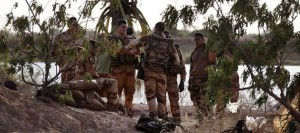2013-02-01 In a recent interview with the weekly newsmagazine, L’Express, Lt. General (Retired) Gaviard discussed France, Europe and the Mali crisis.
Why are the European states reticent to engage with the French forces in the Serval operation?
Historically, France always had a hard time convincing European countries to commit at its side in Africa.
Let’s take the example of the Artemis Operation, in the North-East of the Democratic Republic of Congo in May 2003. Under the European Union (EU) flag and led by the French generals Neveux and Thonier, the mission attracted only very few European countries, except for Swedish special forces.
This operation, endorsed by the UN, was limited to 90 days, and the time limit was respected.
Today, the issue of the withdrawal from Afghanistan is what’s on the mind of the member states. Few of them are willing to join us, out of fear of a long stalemate.
Lastly, the last reason for this lack of enthusiasm has to do with a well anchored willingness to appeal to NATO when an operational engagement is required. Our British friends, but also the Dutch, Spanish, Italians and German have little “appetite” for a EU-backed intervention, especially when France leads it.
Is this European foot-dragging in the Malian case explained by the French readiness to act alone?
France did not want to act alone; rather they were forced to act alone.
After pushing back the Malian troops in Konna, the jihadists represented a serious threat for the country’s sovereignty as well as for the security of the 6,000 French citizens residing in Bamako’s region.
Quick action was needed. The French forces prepositioned in Africa were the only European forces to enter the theater in order to put an end to the jihadist breakthrough in accordance with the United Nations resolution and with the request of the interim Malian president.
Subsequently, France offered its partners to join her at its side, but to no avail.
What other roles could member States play?
A quick end to the crisis should be considered.

The two parallel missions, on one side, the African-led International Support Mission to Mali (AFISMA), and on the other side, the European Union Training Mission Mali (EUTM), will not suffice.
What is needed is a stake in the rebuilding of the Malian state in the framework of a “global approach. ”
The Europeans could contribute, on the basis of what is done in Niger, where a force called EUCAP/NIGER, financed by the EU, is in charge of the police and gendarmerie training.
A proposal that would see the EU commit to Mali in several domains like the police, the judiciary etc. should be brought forward.
This would contribute to the stabilization of the country and perhaps help in avoiding acts of vengeance, as we already have seen in certain zones recaptured by the Malian armed forces.
Lt. General (Retired), Jean-Patrick Gaviard is the former chief of operations of the French Joint Chief of Staff.
The translation has been provided by Franck Znaty and is produced with the permission of General Gaviard.
https://sldinfo.com/biography-lieutenant-general-gaviard/
For other pieces on France and Mali published on Second Line of Defense see the following:
https://sldinfo.com/france-and-mali-what-role-for-coalitions/
https://sldinfo.com/the-french-serval-operation-the-double-edged-sword-of-the-mali-operation/
http://www.sldforum.com/2013/01/re-building-us-strategy-missing-the-point-of-allies/

